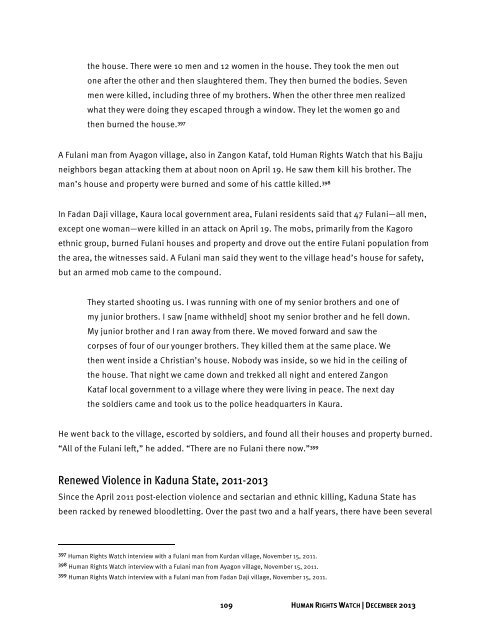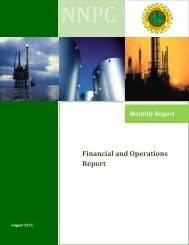Create successful ePaper yourself
Turn your PDF publications into a flip-book with our unique Google optimized e-Paper software.
the house. There were 10 men and 12 women in the house. They took the men out<br />
one after the other and then slaughtered them. They then burned the bodies. Seven<br />
men were killed, including three of my brothers. When the other three men realized<br />
what they were doing they escaped through a window. They let the women go and<br />
then burned the house. 397<br />
A Fulani man from Ayagon village, also in Zangon Kataf, told Human Rights Watch that his Bajju<br />
neighbors began attacking them at about noon on April 19. He saw them kill his brother. The<br />
man’s house and property were burned and some of his cattle killed. 398<br />
In Fadan Daji village, Kaura local government area, Fulani residents said that 47 Fulani—all men,<br />
except one woman—were killed in an attack on April 19. The mobs, primarily from the Kagoro<br />
ethnic group, burned Fulani houses and property and drove out the entire Fulani population from<br />
the area, the witnesses said. A Fulani man said they went to the village head’s house for safety,<br />
but an armed mob came to the compound.<br />
They started shooting us. I was running with one of my senior brothers and one of<br />
my junior brothers. I saw [name withheld] shoot my senior brother and he fell down.<br />
My junior brother and I ran away from there. We moved forward and saw the<br />
corpses of four of our younger brothers. They killed them at the same place. We<br />
then went inside a Christian’s house. Nobody was inside, so we hid in the ceiling of<br />
the house. That night we came down and trekked all night and entered Zangon<br />
Kataf local government to a village where they were living in peace. The next day<br />
the soldiers came and took us to the police headquarters in Kaura.<br />
He went back to the village, escorted by soldiers, and found all their houses and property burned.<br />
“All of the Fulani left,” he added. “There are no Fulani there now.” 399<br />
Renewed Violence in Kaduna State, 2011-2013<br />
Since the April 2011 post-election violence and sectarian and ethnic killing, Kaduna State has<br />
been racked by renewed bloodletting. Over the past two and a half years, there have been several<br />
397 Human Rights Watch interview with a Fulani man from Kurdan village, November 15, 2011.<br />
398 Human Rights Watch interview with a Fulani man from Ayagon village, November 15, 2011.<br />
399 Human Rights Watch interview with a Fulani man from Fadan Daji village, November 15, 2011.<br />
109 HUMAN RIGHTS WATCH | DECEMBER 2013




